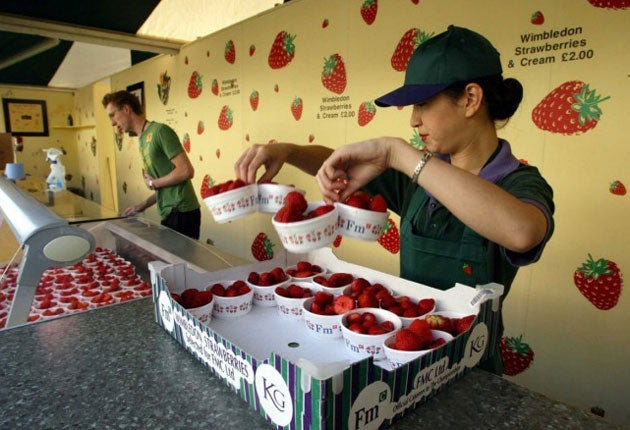Strawberry boom may be out of juice by summer

Your support helps us to tell the story
From reproductive rights to climate change to Big Tech, The Independent is on the ground when the story is developing. Whether it's investigating the financials of Elon Musk's pro-Trump PAC or producing our latest documentary, 'The A Word', which shines a light on the American women fighting for reproductive rights, we know how important it is to parse out the facts from the messaging.
At such a critical moment in US history, we need reporters on the ground. Your donation allows us to keep sending journalists to speak to both sides of the story.
The Independent is trusted by Americans across the entire political spectrum. And unlike many other quality news outlets, we choose not to lock Americans out of our reporting and analysis with paywalls. We believe quality journalism should be available to everyone, paid for by those who can afford it.
Your support makes all the difference.If there's one thing British tennis fans can rely on at Wimbledon it's overpriced strawberries and cream – a tradition as associated with the championship as intense national disappointment.
This year, however, there may be less to sweeten the bitter aftertaste of inevitable loss as freak weather brings with it the prospect of empty punnets.
Record temperatures across Britain throughout April combined with scant rainfall have led to the earliest harvest in decades for many strawberry farms.
Farmers in the south of England are warning the early harvest could leave fields bare by June, when demand around Centre Court – and on supermarket aisles across the country – is at its highest.
"My gut feeling is that by Wimbledon fortnight there isn't going to be much fruit around, because of the early start," said Paul Keene, who runs a pick-your-own strawberry farm in Gloucestershire.
Dennis Hilsdon's farm on the south coast near Eastbourne has started picking earlier this year than it has for more than a decade.
"We could be a bit short during Wimbledon. We normally peak just before then in June but we've had an early start this year like many others," he said.
The potential shortage is the latest challenge faced by Britain's fruit farmers after a turbulent few years. In 2007, a shortage of migrant workers from eastern Europe led to acres of strawberrries being left to rot.
Bad publicity about conditions and pay on British fruit farms meant the large numbers of migrant workers that had previously travelled from places like Poland sought seasonal jobs elsewhere in Europe.
The problem was repeated the following year in 2008, when growers struggled to recruit enough labourers to pick an estimated 50,000 tons of strawberries, raspberries and other soft fruit.
More recently, pick-your-own farms have reported losing thousands of pounds due to greedy pickers eating more than they had paid for, and one of the largest pick-your-own farms was closed because the owners could not afford to install handrails as required by health and safety laws.
Strawberry farms across the country enjoy an annual boost every year during Wimbledon. Each year, approximately 27,000 kilos of strawberries are eaten during the event, together with 7,000 litres of cream.
While farmers in the South may be worrying about the Wimbledon period, some are more optimistic. There is a good chance the gap could be filled by strawberries grown in Scotland, according to Laurence Olins, chairman of British Summer Fruits.
"There is always a possibility of a shortage but I wouldn't bet on it. Everything has moved forward so fruit that we expected to pick in July is looking to be picked in June," he said.
"Scotland has got big volumes that would cover the Wimbledon period. Obviously we are selling a lot of fruit now, and fruit can only be sold once," he added.
Even without a shortage, there is a good chance that the strawberries on offer this year might taste a little different.
"We have Everbearer strawberries, which is a completely different crop. They are a sweeter berry than the ones we are eating now and they grow for a longer period," said Mr Olins.
The freak spring weather has led to anomalies in the growth of various fruit crops, including grapes and plums. But there is one thing that every farmer agrees upon. "The warm April was good," says John Hickey, owner of Binfield vineyard near Wokingham in Berkshire. "But now all we want is a drop a rain."
Good crop, bad crop
Losers
*Plums
A cold snap last week followed by high daytime temperatures has led to the devastation of many British plum crops. Some growers have reported an 80 per cent loss of their yield.
*Broccoli
Broccoli is a cool-weather crop that suffers during periods of hot weather such as that experienced in April and during May. One grower in Lincolnshire is expecting to write-off his entire crop if there is no rainfall within the next two weeks.
*Potatoes
Any crop growing in the ground is at risk from frost. Many potato farmers reported damage to their crops after freezing conditions last week.
Winners
*Apples and pears
The warm April weather looks set to produce a deluge of apples and pears this summer. Although the current crop is still at risk from a cold snap.
*Grapes
Most vineyards will have benefited from the warmest April on record. Some reported a minor setback due to the frost last week, but most are expecting a strong year.
*Strawberries
A month of warm weather in April has led to bumper crops much earlier than usual. It's good news for British growers, as one supermarket chain has cut its imports of strawberries by 50 per cent thanks to the glut of home-grown fruit.
Join our commenting forum
Join thought-provoking conversations, follow other Independent readers and see their replies
Comments